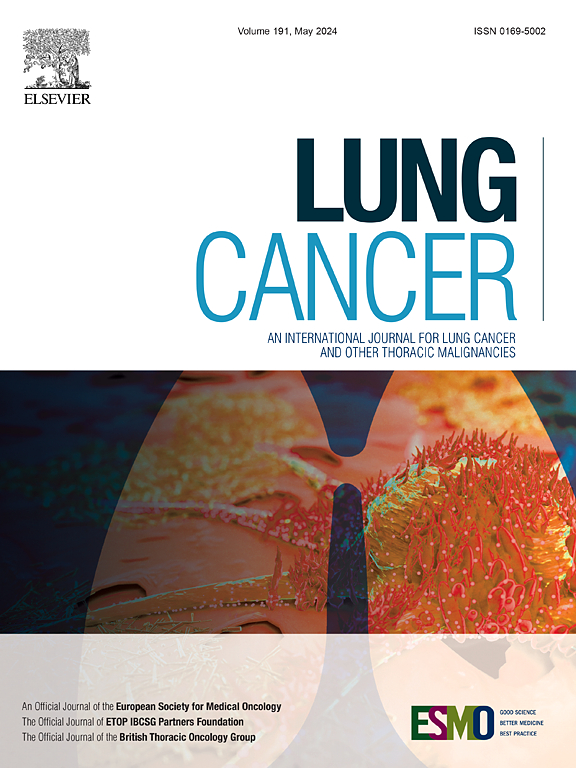Effective treatment strategies and key factors influencing therapeutic efficacy in advanced SMARCA4-deficient non-small cell lung cancer
IF 4.5
2区 医学
Q1 ONCOLOGY
引用次数: 0
Abstract
Introduction
SMARCA4/BRG1-deficient non-small cell lung cancer (SD-NSCLC) with high invasiveness and poor prognosis is associated with primary resistance to standard treatment, especially in late-stage patients. This study aimed to explore effective treatments and identify critical factors impacting therapeutic efficacy to enhance outcomes for SD-NSCLC patients.
Methods
103 SD-NSCLC patients in stage III/IV diagnosed by immunohistochemistry from May 2019 to March 2024 were included in this study. We assessed the patients’ clinical and genetic features, analyzed the clinical outcomes of local treatment and immunotherapy according to the TNM stage, and further evaluated the factors impacting therapeutic efficacy.
Results
In stage III patients, no significant differences in the median progression-free survival (mPFS) and median overall survival (mOS) were observed between patients receiving local treatment at the primary site and those who did not (p > 0.05), while adding ICIs (immune checkpoint inhibitors) to local treatment significantly improved mPFS compared with non-ICIs (15.0 vs. 7.7 months, p = 0.033), though not mOS (p > 0.05). For stage IV patients, ICIs significantly improved mPFS (8.9 vs. 4.2 months, p = 0.006) and mOS (19.7 vs. 13.1 months, p = 0.007) compared to non-ICIs treatments. However, among ICIs-treated patients, the addition of local treatment to the primary lesion did not significantly affect mPFS and mOS (p > 0.05). Patients with STK11/KEAP1 mutations had significantly shorter mPFS (3.6 vs. 16.2 months, p = 0.001) and mOS (17.7 vs. 31.3 months, p = 0.002), while no significant difference was observed in mPFS and mOS in patients with different tumor mutation burden (TMB) and PD-L1 expression levels.
Conclusion
The addition of ICIs to local treatment shows promising results for locally advanced patients with SD-NSCLC, and first-line ICIs are associated with improved survival in metastatic SD-NSCLC. STK11/KEAP1 mutations may be linked to reduced efficacy of immunotherapy.
晚期 SMARCA4 缺陷非小细胞肺癌的有效治疗策略和影响疗效的关键因素。
简介SMARCA4/BRG1缺陷型非小细胞肺癌(SD-NSCLC)侵袭性强、预后差,与标准治疗的原发性耐药有关,尤其是晚期患者。本研究旨在探索有效的治疗方法,并找出影响疗效的关键因素,以提高SD-NSCLC患者的预后。方法:本研究纳入了103例于2019年5月至2024年3月期间通过免疫组化确诊的III/IV期SD-NSCLC患者。我们评估了患者的临床和遗传特征,根据TNM分期分析了局部治疗和免疫治疗的临床效果,并进一步评估了影响疗效的因素:在III期患者中,原发部位接受局部治疗的患者与未接受局部治疗的患者在中位无进展生存期(mPFS)和中位总生存期(mOS)上无明显差异(P > 0.05),而在局部治疗中加入ICIs(免疫检查点抑制剂)与未加入ICIs相比,可显著改善mPFS(15.0个月 vs. 7.7个月,P = 0.033),但不能改善mOS(P > 0.05)。对于 IV 期患者,与非 ICIs 治疗相比,ICIs 能明显改善 mPFS(8.9 个月对 4.2 个月,p = 0.006)和 mOS(19.7 个月对 13.1 个月,p = 0.007)。然而,在接受 ICIs 治疗的患者中,对原发病灶增加局部治疗对 mPFS 和 mOS 没有明显影响(p > 0.05)。STK11/KEAP1突变患者的mPFS(3.6个月 vs. 16.2个月,p = 0.001)和mOS(17.7个月 vs. 31.3个月,p = 0.002)明显缩短,而肿瘤突变负荷(TMB)和PD-L1表达水平不同的患者的mPFS和mOS无明显差异:结论:对局部晚期SD-NSCLC患者而言,在局部治疗的基础上加用ICIs显示出良好的效果,而一线ICIs与转移性SD-NSCLC患者生存率的改善相关。STK11/KEAP1突变可能与免疫疗法疗效降低有关。
本文章由计算机程序翻译,如有差异,请以英文原文为准。
求助全文
约1分钟内获得全文
求助全文
来源期刊

Lung Cancer
医学-呼吸系统
CiteScore
9.40
自引率
3.80%
发文量
407
审稿时长
25 days
期刊介绍:
Lung Cancer is an international publication covering the clinical, translational and basic science of malignancies of the lung and chest region.Original research articles, early reports, review articles, editorials and correspondence covering the prevention, epidemiology and etiology, basic biology, pathology, clinical assessment, surgery, chemotherapy, radiotherapy, combined treatment modalities, other treatment modalities and outcomes of lung cancer are welcome.
 求助内容:
求助内容: 应助结果提醒方式:
应助结果提醒方式:


